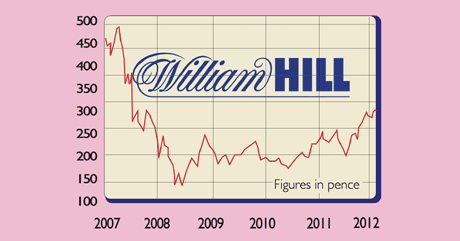
The bookie has had a good year, but further gains are unlikely, says Phil Oakley.
The business
William Hill is Britain’s leading bookmaker. It provides its customers with gaming and betting services in betting shops, over the internet and on the phone. The company specialises in fixed-odds betting, mainly on sporting events. It also offers gaming services, such as roulette, poker, lotteries and bingo.
With 2,370 betting shops, it is the biggest high-street bookmaker in Britain. It processes around one million bets per day and took £17.9bn in bets from customers in 2011. The bulk of the company’s income comes from Britain. It also owns an Italian casino site and 25% of William Hill Online’s revenue comes from overseas.
The history
William Hill founded the company in 1934. Betting shops were not allowed but otherwise there was no regulation of the industry; bookmakers weren’t even legally obliged to pay out on a winning bet. Hill spotted a business opportunity and set up a postal and telephone betting service where the customer would bet by sending a cheque in advance of an event. Hill figured out he could create a successful business as long as he built a reputation based on knowledge and honesty. Betting shops then became legal in the early 1960s, with William Hill opening its first branches in 1966.
When Hill died in 1971, the firm became part of the Sears Holding Group before being bought by conglomerate Grand Metropolitan in 1988. The business was sold again to Brent Walker a year later. The 1990s were difficult times for the company as the introduction of the National Lottery and its scratchcards ate into profits.
In 1997, the firm changed hands again when Nomura bought it for £700m. It then sold it two years later to private-equity buyers for £825m. In 2000, the firm fully embraced the internet by setting up Williamhill.com and an online casino. Then, in 2002, the business floated on the stock exchange.
Investors have had a rocky ride during the last decade. Profits have been volatile and have not grown that much. For much of the time William Hill has been burdened by too much debt. It asked shareholders for more money in 2009 and slashed their dividend payments. Its finances look to be in much better shape now.
The chief executive
Ralph Topping has been chief executive since 2008. Having started out as a William Hill trainee, he has extensive experience of meeting the challenges of the betting industry. He took home £1.7min 2011. His interest in sports extends outside betting and he is chairman of the Scottish Premier League.
Should you buy the shares?
William Hill recently announced that its 2012 first-quarter profits had risen by 19%. Football results have gone in its favour and its profit margins are higher than a year ago. Its online business continues to grow strongly. But what does the future hold?
History tells us that the profits of bookmakers tend to fluctuate frequently. Is William Hill capable of producing steady gains in profits year in, year out? It’s trying to do this by making small investments outside of its core British business in Italy and recently in Nevada and continues to offer its customers new products.
But challenges remain. Competition remains intense, while betting and gambling companies remain an easy tax target for cash-strapped governments. Tougher regulation of online gambling could also be a threat to future profits. William Hill still has a big chain of high-street betting shops with lots of fixed costs and this means that profits from this business could fall sharply if sales decline and more business moves online.
These kind of threats mean that betting companies are unlikely to attract high valuations from the stockmarket. With William Hill shares up by nearly 25% during the last year, we don’t see good money-making opportunities at the current price. We would avoid the shares for now.
The numbers
Stockmarket code: WMH
Share price: 284p
Market cap: £2.0bn
Net assets (Dec 2011): £888m
Net debt (Dec 2011): £347m
P/e (current year estimate): 10.7 times
Yield (prospective): 3.8%
What the analysts say
Buy: 11
Hold: 6
Sell: 6
Average price target: 271.5p
Directors’ shareholdings
R Topping: 395,399
G Davis: 94,000
N Cooper: 2,345